Rooms with a view show the height of grand ambition
Owner's dream comes true with hotel on cliff edge set amidst a stunning landscape, Yang Feiyue reports.

Wang Meng has achieved one of the great satisfactory moments in life: seeing a dream come true.
The 49-year-old's dream was to build a hotel with a dozen pre-constructed rooms on a mountain cliff at the Tiger Leaping Gorge (Hutiaoxia) in Shangri-La, Southwest China's Yunnan province.
Wang had traveled with his wife in the gorge area and had many fond memories. The location sits in the upper reaches of the Jinsha River in Yunnan. At around 3,900 meters deep between the Jade Dragon and the Haba Snow mountains, it's one of the deepest gorges in the world, and has a length of 16 kilometers.
One has to gingerly step along scree-covered mountain trails that satisfy daredevil souls. The view of snow-shrouded mountain peaks and threads of sun rays dancing on the gurgling rocks down below is nothing short of stunning.
However, his wife had no hiking experience and had a bit of trouble adjusting to the intensity and tough natural environment, especially the relatively poor accommodation conditions.
"Seeing her experience those tough nights, I comforted her that I would build a nice house here in the future," Wang says.
In July, Wang's cliff hotel opened to the public and was instantly booked up by adventurous travelers.
Sun Yu from Kunming, capital of Southwest China's Yunnan province, stayed at the hotel during its trial run early this year.
"It's exciting to live in a nice modern place, deep in nature," Sun says.
"I saw clouds dancing around the mountain peak in the morning, resembling a fairyland, and watched stars through the glass ceiling in the evening."
Although pandemic prevention and control measures have seen Wang halt operations for August, he believes it's only a matter of time before travelers come back.
One can take in a full view of the two snow mountains framed by the room's window.
Wang graduated from the School of Geography and Ocean Science, Nanjing University. He was not just drawn to the academic knowledge but fascinated by his professors' sharing of anecdotes about Chinese science expeditions to Mount Qomolangma (known as Mount Everest in the West) and the Antarctic.
This growing curiosity turned into a passion for the great outdoors as he engaged in field studies in the wilderness with his professors during winter and summer vacations.
He's been hiking in river valleys, forests, and many other extreme locations. For example, he used to go camping on snow-capped mountains.
Years of outdoor experience have seen Wang make many friends sharing his interests.
In 2014, Wang and his friends explored the Karakorum Mountain range in the Xinjiang Uygur autonomous region.
In 2017, they trekked 420 kilometers along the ridge of highest peak of the Haba Snow Mountain for 26 days, and were named the best team that year at the Golden Rhino Awards hosted by Outdoor magazine.
As some of his hiking friends have expertise in the fields of design and architecture, Wang revisited his promise years ago to his wife and came up with the idea of building a hotel in a pristine natural environment.
The idea was immediately picked up by his friends.
They wanted a nice stay for hiking enthusiasts to better enjoy the natural thrills.
"We'd like them to see valleys, snow mountains and starry nights comfortably in bed, encouraging more to appreciate nature's charm," Wang says.
"Even if the business doesn't go well, we can use it as our own place for leisure time, and it would still be worth it."
They eventually settled on the Tiger Leaping Gorge after considering more than 200 sites, all of which featured stunning natural beauty and were off the beaten track.
Many of them are hidden in Shangri-La, Nujiang Lisu autonomous prefecture, Baoshan city and Dehong Dai and Jingpo autonomous prefecture of Yunnan.
"The valley has distinctive geological features and a rich natural landscape," Wang says.
The gorge is divided into three parts. The upper section has been well developed and receives the majority of group travelers.
The other two sections are untouched by human development.
Wang and his friends chose the middle section of the gorge.
The hotel site is an old rural abode about 1,800 meters above sea level, one of the lowest points in Shangri-La and the safest, geographically speaking. It's about two hours drive from Lijiang Sanyi International Airport.
A geology major, Wang also knew it would take at least 40,000 years for a concrete brick to decompose, which could impair the local environment.
Taking all factors into account, Wang and his friends decided to create container-like rooms, which would reduce the environmental impact.
In 2018, Wang started to visit factories where the pre-designed container rooms could be assembled.
"We want our rooms to be of high standards, such as offering better thermal and sound proof than the garden-variety ones, because of the tough natural environment," Wang explains, adding that he and his friends also have their own requirements for the room design.
Afterwards, they had the rooms assembled in the city and prearranged the interior layout before having them sent to the depths of the mountains and hoisted to their final location.
To Wang's surprise, it took merely three months to finish all the moveable rooms, much quicker than if he had taken a traditional construction approach.
Moreover, the local soil was undisturbed, since all the rooms were placed on the original foundation of the original rural residence.
Every room is about 21 square meters, which is the maximum allowed for road transportation.
The hotel covers an area of 4,000 square meters, on the edge of the steep cliff, with all the independent rooms fanning out along the mountain curve.
All the arrangements were carefully calculated to ensure the best use of natural light and unhindered view of the landscape.
Each room has breathtaking views. For example, the exterior wall of each that faces the cliff has a big French window. It allows guests to watch the rippling valley river and the Jade Dragon Mountain.
Proximity toward the equator, big elevation difference and sufficient water have also rendered the area around the hotel with a rich biological and vegetational diversity that can be found in the south and north of the country, and even the Arctic Circle.
A waterscape terrace is placed in the middle that serves as a party venue and a humidifier for the air.
The walls in the yards are made of stones found in the mountain.
Sediment pool and wastewater treatment equipment have been put in place. The treated water will be used to water plants, and domestic refuse will be collected and sent to professional facility.
Wang has now found his new joy of taking his guests around the gorge.
He has developed two routes for guests to choose.
The first one runs along the Jinsha River and is more physically demanding. Travelers can see up close one of the most spectacular sections of the river.
For the other one, Wang arranged a service that drives guests along the winding mountain road and past a waterfall.
"It feels good when your guests have a nice hike which they wouldn't dream of finishing before," he says.
"The best we could do is to lead them to enjoy the beauty of nature safely and comfortably."
Speaking about the future, Wang says he might deliver those moveable rooms to other hidden jewels of nature that come his way and stay there for a while.
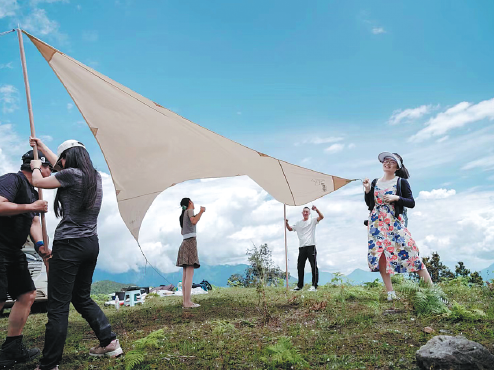
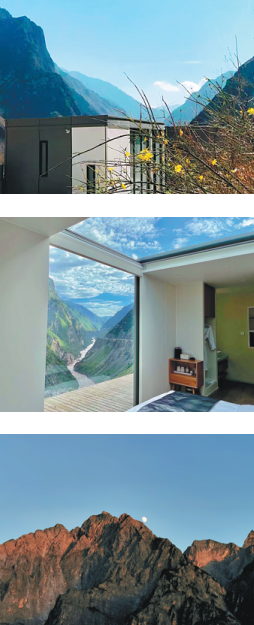
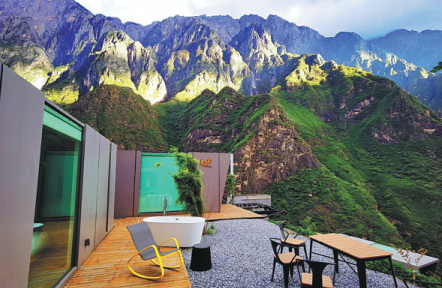
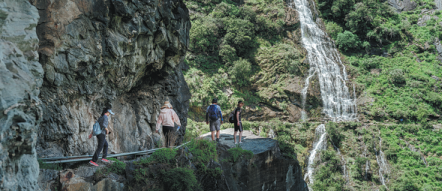
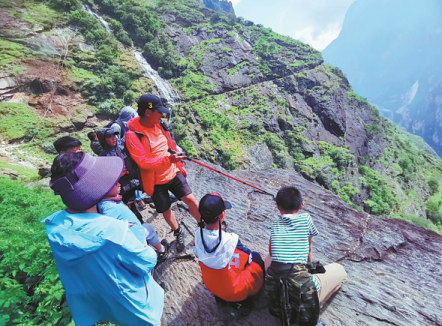
Today's Top News
- Washington should realize its interference in Taiwan question is a recipe it won't want to eat: China Daily editorial
- Responsible role in mediating regional conflict: China Daily editorial
- US arms sale only a 'bomb' to Taiwan
- China-Cambodia-Thailand foreign ministers' meeting reaches three-point consensus
- Drills demonstrate China's resolve to defend sovereignty against external interference
- Trump says 'a lot closer' to Ukraine peace deal






























